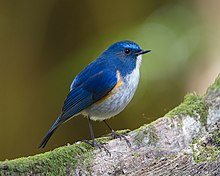| Himalayan bluetail | |
|---|---|

| |
| Male at the summit of Doi Inthanon, Thailand | |

| |
| Female in winter habitat, Sarmoli Village, Munsiari, Uttarakhand India at 2250 m altitude | |
| Conservation status | |
 Least Concern (IUCN 3.1) | |
| Scientific classification | |
| Domain: | Eukaryota |
| Kingdom: | Animalia |
| Phylum: | Chordata |
| Class: | Aves |
| Order: | Passeriformes |
| Family: | Muscicapidae |
| Genus: | Tarsiger |
| Species: | T. rufilatus |
| Binomial name | |
| Tarsiger rufilatus (Hodgson, 1845) | |
| Synonyms | |
|
Tarsiger cyanurus rufilatus
| |
The Himalayan bluetail (Tarsiger rufilatus), also called the Himalayan red-flanked bush-robin or orange-flanked bush-robin, is a small passerine bird that was formerly classed as a member of the thrush family Turdidae, but is now more generally considered to be an Old World flycatcher of Muscicapidae. While currently under review, this taxon is not current recognized as a species by BirdLife international.
It is closely related to the red-flanked bluetail and was generally treated as a subspecies of it in the past, but as well as differing in its migratory behaviour (the red-flanked bluetail is a long-distance migrant), it also differs in the more intense blue colour of the adult males and the greyer colour of the females and juveniles.
Description and distribution
The Himalayan bluetail is a short-distance altitudinal migrant species, breeding in the Himalaya in bush layer (dwarf rhododendron in wetter areas, deciduous bushes in drier) of conifer and mixed conifer-oak forest, main species fir (Abies) but sometimes in areas with Picea smithiana or Pinus wallichiana/Cupressus torulosa forest; at 3000–4400 m, not penetrating beyond tree-line and in winters found at 1,500–2,500 m typically in broadleaf evergreen forest, dense dark undergrowth and thickets, clearings, treefall gaps with vine tangles, open woodland; commonly seen along tracks; favours ridges and mountain tops. It is insectivorous.
References
- BirdLife International (2016). "Tarsiger rufilatus". IUCN Red List of Threatened Species. 2016: e.T22736114A104348451. doi:10.2305/IUCN.UK.2016-3.RLTS.T22736114A104348451.en. Retrieved 13 November 2021.
- "Tarsiger rufilatus". Avibase.
- Grimmett, Richard; Inskipp, Tim (2003). Birds of Northern India. New Delhi: Oxford University Press. pp. 202–203. ISBN 0195668286.
- BirdLife species factsheet for Tarsiger rufilatus
- Hoyo, J. del; et al., eds. (2005). Handbook of the Birds of the World, vol. 10. Barcelona: Lynx Edicions. p. 754. ISBN 84-87334-72-5.
- Rasmussen, P. C., & Anderton, J. C. (2005). Birds of South Asia: the Ripley Guide. Barcelona, Spain: Lynx Edicions. ISBN 84-87334-67-9.
- "Orange-flanked Bush-robin (Tarsiger cyanurus)". hbw.com. doi:10.2173/bow.refblu.01. S2CID 240668577. Retrieved 2017-01-12.
- Collar, N. & de Juana, E. (2017). Orange-flanked Bush-robin (Tarsiger cyanurus). In: del Hoyo, J., Elliott, A., Sargatal, J., Christie, D.A. & de Juana, E. (eds.). Handbook of the Birds of the World Alive. Lynx Edicions, Barcelona.
| Taxon identifiers | |
|---|---|
| Tarsiger rufilatus | |
This article about an Old World flycatcher is a stub. You can help Misplaced Pages by expanding it. |